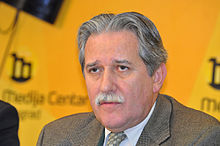Slobodan Samardžić
|
Dr Slobodan Samardžić Слободан Самарџић |
|
|---|---|
 |
|
| Minister for Kosovo and Metohija | |
|
In office 15 May 2007 – 7 July 2008 |
|
| Preceded by | Post established |
| Succeeded by | Goran Bogdanović |
| Personal details | |
| Born |
3 April 1953 Belgrade |
| Nationality | Serbian |
| Political party |
Democratic Party of Serbia (until 2014) Statehood Movement of Serbia (2014–present) |
| Spouse(s) | Vesna Samardžić, née Olić |
| Children | Two sons and a daughter |
| Residence | Belgrade, Serbia |
| Alma mater | University of Belgrade (BA, MPhil and PhD in political science) |
| Occupation | University professor |
| Profession | Political scientist |
| Religion | Serbian Orthodox |
Slobodan Samardžić (Serbian Cyrillic: Слободан Самарџић) is a Serbian academic and politician, and the former Minister for Kosovo-Metohija in the Government of Serbia succeeded by Goran Bogdanović.
Slobodan Samardžić was born in Belgrade in 1953 to Bosnian Serb and Montenegrin Serb parents. He belongs to a prominent Montenegrin Samardžić family that originates from the Herzegovinian Krivošije region and clan near Herceg Novi, in Montenegro.
Samardžić graduated from the Faculty of Political Sciences of the University of Belgrade, where he also obtained his PhD. He was editor of scientific and political programme at Radio Belgrade from 1982 to 1984. He was a fellow of the Institute of European Studies. Since 2001 Samardžić is a full professor of European Studies at the Faculty of Political Sciences of the University of Belgrade. He is also Director of Political Studies at the Belgrade think-tank Centre for Liberal-Democratic Studies.
Area of his studies includes political ideas and institutions, contemporary federalism, political theory and practice of constitutionalism, political system of Yugoslavia and Serbia, and European Union. His long-term study visits include Göttingen, Frankfurt, Fribourg and Brussels. Samardžić wrote six books: Ideology and Rationalism (1984), Council Democracy (1987), Yugoslavia and the Challenge of Federalism (1990), Coercive Community and Democracy (1994), European Union as a Model of the Supranational Community (1998), and State Construction and Deconstruction (2008).
...
Wikipedia
